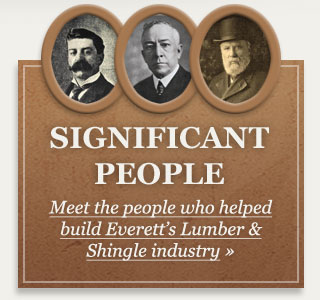
Photo courtesy Everett Public Library
James J. Hill
James J. Hill never lived in Everett, rarely visited the city and never owned or operated an Everett mill. But this captain of industry was more responsible than anyone for the development of the wood products industries on Everett’s waterfront. When Hill brought his Great Northern Railway from the Midwest to Puget Sound in 1893, he realized the future of places like Everett was in the vast stands of timber that lined the valleys and mountainsides. His moment to capitalize on that potential arrived at the turn of the 20th century when he crafted two business deals that would change the course of Everett’s history.
First, he bought the remaining assets of the failed Everett Land Company from John D. Rockefeller. His intent was clear: He would make Everett a mill town and ship the finished product by rail to market. About the same time he arranged the sale of 900,000 acres of Northern Pacific Railroad (a company he largely controlled by this time) prime Pacific Northwest federal land grant timber lands to his St. Paul, Minnesota, next door neighbor Frederick Weyerhaeuser for $5.4 million. The sale accomplished two things for Everett. First, it influenced other Midwestern lumbermen, who had highest regard for Weyerhaeuser’s business acumen, to follow his lead. If he was looking to the Pacific Northwest, perhaps they should too. Second, it put Weyerhaeuser in a position of looking for a mill site in the Puget Sound area. He found that site when he bought Everett’s Bell-Nelson Mill in 1902 and renovated it, establishing the fist Weyerhaeuser mill in the Pacific Northwest.
Once Hill had the Everett Improvement Company underway, men like David M. Clough, eminent lumberman and former governor of Minnesota, were invited to start mills in Everett. Powerful lumber operatives followed Clough, and a flood of individuals arrived to work in the new plants. While all might not have been personally recruited by Hill, it was clear that early North Waterfront lumbermen such as Olof Carlson, George Bergstrom, Fred Baker, William Hulbert, Roland Hartley, and Neil Jamison were there because of James J. Hill’s vision.

